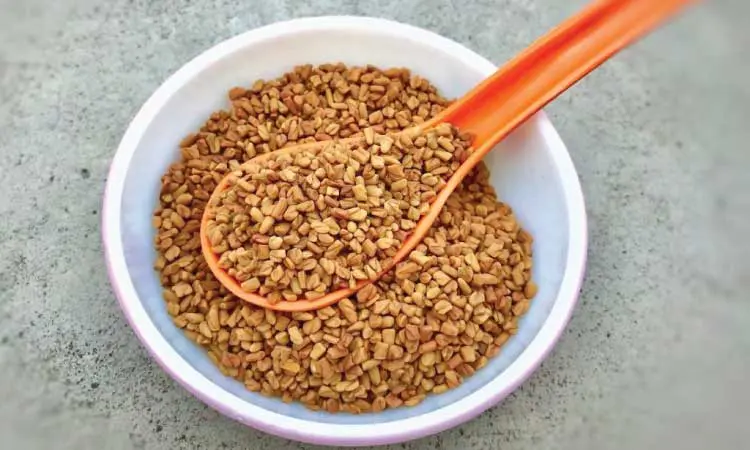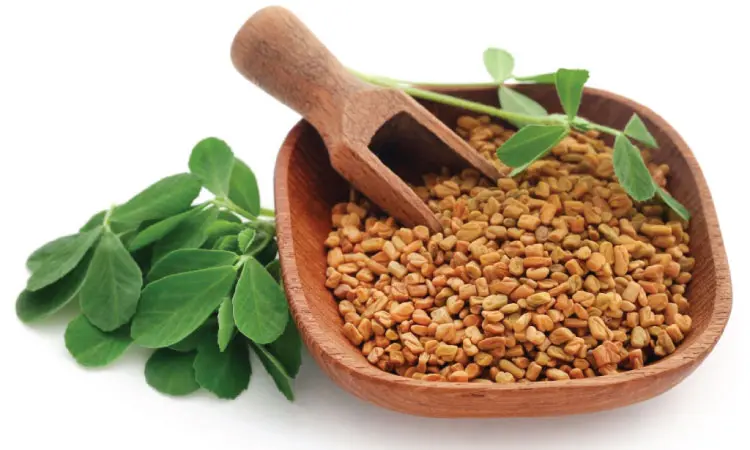Right after the pregnancy test turns positive, one of the most important concerns of soon-to-be mothers will be the food they eat. The food they eat does have a huge impact on the health of the fetus and progressing pregnancy. Have you heard about methi ladoos that are given to pregnant women? In this article let’s talk about consuming fenugreek during pregnancy, one of the foods many expecting mothers are unsure of eating.
Fenugreek is one of the herbal remedies used to treat many health issues. It is one of the important ingredients in many Indian cuisines as well. Leaves and seeds of the fenugreek plant have medicinal value and often find their way into the Indian kitchens.
Is It Safe To Eat Fenugreek During Pregnancy?
When it comes to pregnancy, one should be extra cautious about herbal intake. The concentration of certain constituents in many herbs can have an adverse impact on the feeble pregnant body.
Our panel gynaecologist Dr Ankita Patel Tayal says that when it comes to fenugreek, there are not enough studies or researches conducted to mark the herb as unsafe or even 100% safe during pregnancy. However, fenugreek has been used during pregnancy. We are not overlooking the amazing range of health benefits of fenugreek either. But you can reap its benefits during pregnancy only if you have taken it in limited quantities.
The health of the soon-to-be moms and healthy progression of pregnancy is mainly based on the hormonal balance. Excessive intake of herbs like fenugreek can impair this hormonal balance thereby, bringing about complications.
Excessive intake of fenugreek during pregnancy could lead to severe complications including miscarriage. Therefore, when you eat fenugreek and how much fenugreek you eat determines its safety during pregnancy.
How Much Fenugreek Is Safe During Pregnancy?
It is safe to consume a small amount of this herb during pregnancy. However, make sure it is restricted to 3 to 4 grams. In other words, adding a little amount of fenugreek in curry during pregnancy causes no harm.
Do Fenugreek Seeds Cause Miscarriage?

Fenugreek is well known for its property of inducing uterine contractions. As this herb is used to induce labor, using it during the first trimester or excessive intake during any point of pregnancy has an increased risk of miscarriage/ preterm delivery.
Calculate Due Date With LMP
Benefits Of Fenugreek During Pregnancy
Fenugreek is a herb that carries a wide range of health benefits and many of its medicinal properties are advantageous for the healthy progression of the pregnancy. Here are some benefits of fenugreek during pregnancy if taken in moderate amounts:
1. Fights gestational diabetes
Fenugreek helps to combat gestational diabetes. This herb is well known for its anti-diabetic property. People who struggle with keeping their blood sugar levels within control resort to consuming methi dana as a home remedy. Even though fenugreek helps to fight off gestational diabetes, it is important to seek a doctor’s advice before making it a part of the pregnancy diet.
Related Reading: Spinach During Pregnancy – Benefits, Risks And Precautions
2. Aids in breast enlargement
The surge of pregnancy hormones can result in hormonal fluctuations or imbalance. In that case, some soon-to-be moms experience unequal or disproportionate breast enlargement during pregnancy. Steeping fenugreek in warm water and drinking this concoction every day will promote the augmentation of the breast.
Post delivery methi is often recommended to new mothers to boost breast milk supply.
3. Helps to induce uterine contraction
In India, for ages, fenugreek has been used to induce uterine contraction and labor. So if you ask can fenugreek cause labor, the answer is yes, it can. Even prolonged labor that could take a toll on the body and mind of the women can be shortened by means of fenugreek.
Midwives used to urge the woman to drink fenugreek tea as the labor nears. Fenugreek, thus, eases the labor pain.
Side Effects Of Fenugreek During Pregnancy

Dr Ankita Patel Tayal, practising obstetrician & gynaecologist for last 10 years, cautions women that during pregnancy, one should be more vigilant about the side effects of everything they put in their mouth. Only if the benefits outweighs the side effects they should settle on that particular food. Always there will be foods that carry the same benefits with less or no side effects.
Fenugreek has some strong properties. Therefore, excessive intake of this herb can bring about some potential side effects. Here top 5 side effects of fenugreek during pregnancy that you should be conscious of:
1. Fenugreek can trigger digestive issues
One of the organ systems that pregnancy takes a toll on is the digestive system. Many soon-to-be mothers have complained consuming fenugreek has caused various digestive issues. That is when they consumed it on regular basis.
Some of the digestive problems caused due to fenugreek are stomach upset due to indigestion, bloating, nausea, vomiting, and diarrhea. The intensity, of course, varies person to person.
2. Increases the risk of miscarriage
Excessive consumption of fenugreek results in strong uterine contraction. While this uterine stimulant property of fenugreek is beneficial towards the end of pregnancy, this property increases the risk of miscarriage during the first and second trimesters and pre-term delivery in the third trimester.
Related Reading: 10 Common Causes Of Miscarriage
3. Urinary issues
Excessive consumption of fenugreek during pregnancy is found to bring about an odd reaction in terms of urine formation. Both fenugreek and maple syrup contains some common constituent. Therefore, consumption of fenugreek during pregnancy results in maple syrup smelling urine.
Maple syrup urine, in this case, causes no potential harm for mother and fetus. However, it could be wrongly interpreted as a rare and dangerous disease- maple syrup disease, as maple syrup smelling urine is the classic sign of this disease.
4. Fenugreek trigger allergic reactions
According to studies, just like any other herbs, fenugreek can also cause hypersensitive reactions during pregnancy. The allergic reactions of fenugreek comprise wheezing, nasal congestion, cough, and swellings in body parts.
5. Fenugreek interacts with drugs
Fenugreek has strong medicinal properties and therefore, it is found that this herb interferes with blood–thinning medicines like aspirin, naxopren, etc. by lowering the impact of these medicines.
Note: Only over-consumption of fenugreek brings about all the above-mentioned side-effects. Intake of fenugreek is not at all harmful if you take it in limited quantity.
Is Methi Ladoo Good During Pregnancy?
Yes, methi ladoo during pregnancy are good. However, having one ladoo once in a while is good during pregnancy. Even though the name is methi ladoo, only one tablespoon of methi is used to make around 20 to 25 methi ladoos. So there are no chances of over-consumption if you eat one ladoo per day.
Also, other ingredients of methi ladoo, like whole wheat atta (wheat flour), fennel seeds, jaggery, and dried ginger powder are also good during pregnancy. Each of these ingredients provides vitamins and minerals beneficial during pregnancy.
However, once you enter your 37th week of pregnancy, you can have as much as ladoo you want, because, after this point, intake of fenugreek induces contractions, reduces painful labor, and promotes easy delivery.
When To Start Eat Methi Ladoo In Pregnancy
You can have fenugreek ladoo any time after your first trimester. Avoid methi ladoo completely during the first trimester as there is an increased risk of miscarriage. However, even during the second and third trimester make sure you have one ladoo per day and make sure you have it once in a while.
Methi ladoo can be consumed as you please after the 37th week of pregnancy.
Is It Ok To Eat Methi Leaves During Pregnancy

Come winters and Indians cannot resist the many greens that the season offers. Methi leaves too become a part of everyday cuisine in many households, simply because of the amazing health benefits it provides. Intake of green methi leaves in pregnancy is also beneficial. You can have a fistful of clean, fresh, methi leaves per day without any concerns. Methi leaves have a unique aroma that is appealing for pregnant women. Sundried form of methi leaves – Kasuri methi– is the main ingredient of many north Indian dishes.
Moreover, methi leaves contain vitamins and minerals that are highly beneficial during pregnancy. It is rich in iron. It also contains an immense amount of carbohydrates and calcium. One fist full of methi leaves provides around 40% of daily required calcium.
It also contains a significant amount of protein. Methi leaves also contain vital minerals for pregnancy like potassium, sodium, and magnesium. It also contains an incredible amount of folate and vitamin B 12. Therefore, methi leaves during pregnancy aids in fetal brain development of the brain and prevents neural birth defects as well.
Ways to consume methi leaves during pregnancy
- You can just stir fry it in little ghee and have it with roti or rice
- You can make methi parathas. Methi paratha during pregnancy is considered a healthy food. For extra nutrition, grate some beetroot into the dough as well.
- You can also add it to dal. Methi leaves give normal everyday dal an irresistible flavor
- You can crush Kasuri methi and garnish or add to any stir-fried vegetables. Particularly in paneer dishes
Methi leaves can be used in any type of cooking, you can enhance the flavor and nutritional value of vegetarian and non-vegetarian dishes by adding some crushed Kasuri methi into them.
Conclusion
In a nutshell, we can say consuming fenugreek and methi leaves in limited quantities helps to reap its health benefits during pregnancy. So if your mother or mother-in-law insists on you having the methi ladoos with the edible gum, go for it. However, one important point you should keep in mind that pregnancy is not a time to experiment. Therefore, if you never had this herb before, it is better to avoid it during pregnancy.
Likewise, even if you used to/ love to eat fenugreek ladoo and methi leaves dishes, limit its quantity during pregnancy. Remember, a different person’s body is not supposed to react to the same herbs similarly. Therefore always take the cues of your body when it comes to pregnancy.


